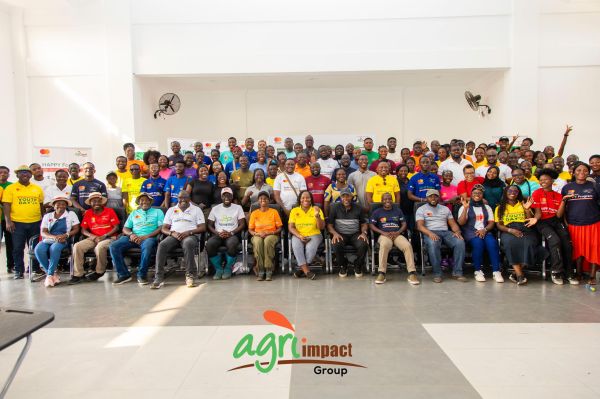Nearly 100,000 young Ghanaians have found sustained employment in agriculture through the HAPPY (Harnessing Agricultural Productivity and Prosperity for Youth) Programme, a pioneering initiative by the Mastercard Foundation in partnership with the agribusiness leader Agri-Impact Group.Launched in December 2023, the HAPPY Programme aims to transform Ghana's agricultural sector by focusing on four key value chains: rice, soybeans, tomatoes, and poultry where Ghana currently relies heavily on imports.The initiative seeks to reduce Ghana's reliance on food imports, boost self-sufficiency, and create economic opportunities for youth aged 15 to 35, with a special focus on women and persons with disabilities (PWDs), who comprise 70% of the programme's beneficiaries.Speaking at the Kasunya Economic Enclave exhibition, Mr Daniel Acquaye, Group CEO of Agri-Impact Group, celebrated the programme's milestones and outlined its goals. "Our aim is to create 326,000 jobs for young people by 2027.
To date, close to 100,000 have secured jobs within these essential value chains," Mr Acquaye announced, highlighting the programme's contribution to local production and job creation.By fostering domestic production, the Group CEO of Agri-Impact Group added that the HAPPY Programme was set to produce 189,000 metric tonnes of food annually, which could reduce food imports by 10% each year and generate approximately $200 million in income for young Ghanaians.Currently, he said that the programme was being undertaken in 13 out of 16 regions in the country, adding that as it continued to grow, inclusivity remained central, with significant efforts to empower women and PWDs.
As the HAPPY Programme looks to the future, Mr Acquaye expressed confidence in its potential."We are looking to create an additional 130,000 jobs by the end of 2025," he said, noting that the programme was tackling challenges such as land access, technology, and finance to make agriculture an appealing career for Ghana's youth.The HAPPY Programme, he noted plans to expand to other regions, with exhibitions scheduled for Sunyani and Kumawu.
At Kumawu, where 20,000 acres have been allocated by the Omanhene of Kwamu, the National Service Scheme would provide young people with resources and training in tomato and rice production.He noted that the programme's sustainability was driven by eight implementing partners, including NewAge Agric Solutions, National Service Scheme (NSS), Ghana CARES (MiDA), Ghana Enterprises Agency (GEA), Ministry of Food and Agriculture (MoFA), TechnoServe, Catholic Relief Services (CRS) and Jobberman which leveraged government infrastructure and private investments to secure lasting employment for the youth.

